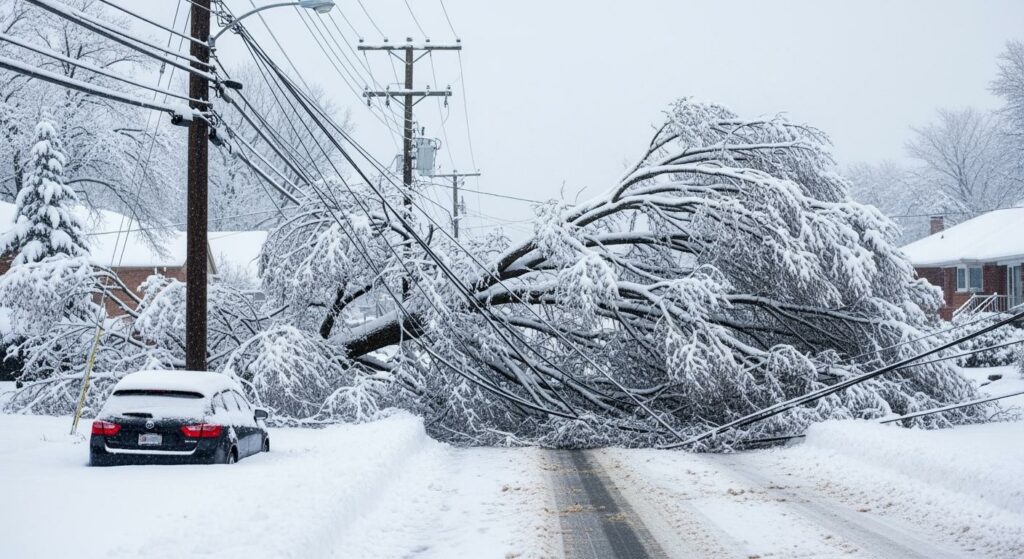
Winter in Madison brings coastal storms, nor’easters, freezing temperatures, and occasional power outages. Being prepared for winter emergencies helps keep your family safe and comfortable when severe weather strikes. Here’s a comprehensive guide to preparing both your home and vehicle for winter emergencies in our Connecticut coastal community.
Home Preparation
Emergency Power Solutions
Generator Safety and Setup
- If you own a generator, have it serviced before winter arrives
- Store fuel safely in approved containers away from living spaces
- NEVER operate generators indoors or in attached garages
- Position generators at least 20 feet from your home with exhaust pointing away from windows and doors
- Consider a transfer switch installation by a licensed electrician for safer power connection
Alternative Heat Sources
- Ensure fireplaces and wood stoves are professionally cleaned and inspected annually
- Store adequate dry, seasoned firewood in a covered area
- For propane or kerosene heaters, follow manufacturer’s instructions strictly and ensure proper ventilation
- Keep combustibles at least three feet from any heat source
- Consider battery-powered space heaters as a safer alternative
Battery Backup
- Invest in portable power stations for charging essential devices
- Keep extra batteries for flashlights, radios, and other emergency equipment
- Consider battery-powered carbon monoxide and smoke detectors in case of power outages
Plumbing Protection
Prevent Frozen Pipes
- Insulate pipes in unheated areas like basements, attics, and garages
- For Madison’s coastal homes, remember pipes in exterior walls facing the water may be especially vulnerable
- Know how to shut off your water main if a pipe bursts
- During extreme cold:
- Keep cabinet doors open to allow warm air to circulate around pipes
- Let cold water drip from faucets served by exposed pipes
- Maintain consistent home temperature day and night
Water Supply Backup
- Store at least one gallon of water per person per day for a minimum of three days
- Keep water purification tablets or a water filter as backup
- Fill bathtubs with water before major storms for non-drinking uses like flushing toilets
Food and Essential Supplies
Food Storage
- Maintain a two-week supply of non-perishable foods that don’t require cooking
- Include ready-to-eat canned meats, fruits, vegetables, and soups
- Store high-energy foods like peanut butter, granola bars, and dried fruits
- Don’t forget special dietary needs for family members
- Rotate your emergency food supply periodically to maintain freshness
Medication and First Aid
- Keep at least a week’s supply of essential medications
- Maintain a complete first aid kit with extra supplies
- Include over-the-counter medications for cold symptoms, pain relief, and digestive issues
Emergency Equipment
- Stock battery-powered or hand-crank emergency radio (NOAA Weather Radio preferred)
- Keep multiple flashlights and lanterns with extra batteries
- Have mobile phone chargers and portable battery packs fully charged
- Store emergency blankets, sleeping bags, and extra warm clothing
- Keep a fire extinguisher accessible
- Consider emergency signaling devices
Home Structural Preparation
Roof and Gutter Maintenance
- Clean gutters and downspouts before winter to prevent ice dams
- Check for and repair loose or damaged roof shingles
- Trim tree branches that could fall on your home during storms
- Consider roof rakes for safely removing snow accumulation
Insulation and Weatherproofing
- Check attic insulation levels and add more if necessary
- Seal windows and doors with weatherstripping or caulk
- Install storm windows or cover windows with plastic from the inside
- Add insulated curtains for additional protection from cold
Snow Removal Equipment
- Have snow shovels, ice scrapers, and ice melt products ready
- Consider investing in a snow blower if you have a large driveway
- Stock sand or cat litter for traction on icy surfaces
- Keep pathways to all exits clear during storms
Vehicle Winter Emergency Preparation
Basic Vehicle Maintenance
Pre-Winter Service
- Have a complete vehicle checkup including battery, antifreeze, wipers, and lights
- Check tire tread and switch to winter tires if possible
- Maintain at least half a tank of gas at all times during winter
- Check tire pressure regularly as it drops in cold weather
- Test your battery—cold weather reduces battery power
Windshield and Visibility
- Replace wiper blades if they’re not clearing effectively
- Use winter-formula washer fluid that won’t freeze
- Keep an ice scraper and snow brush in your vehicle
- Consider applying water-repellent treatment to windows
Vehicle Emergency Kit
Essential Supplies
- Warm blankets or sleeping bags
- Extra warm clothing, boots, hats, and gloves
- High-energy, non-perishable food items and water
- First aid kit with any necessary medications
- Flashlight with extra batteries
- Jumper cables or portable jump starter
- Basic tool kit
- Cell phone charger or power bank
Winter-Specific Items
- Folding shovel
- Bag of sand or cat litter for traction
- Ice scraper and snow brush
- Hand warmers
- Road flares or reflective triangles
- Tow strap or chain
- Small candle in a metal container and matches (for emergency heat)
- Fluorescent distress flag
Navigation and Communication
- Paper maps of Madison and surrounding areas
- List of emergency contact numbers
- Portable phone charger or power bank
- Consider a car emergency alert system
Emergency Protocols
If Stranded in Your Vehicle
- Stay with your vehicle unless safety is very close
- Run the engine and heater about 10 minutes each hour
- Clear snow from exhaust pipe to prevent carbon monoxide poisoning
- Use hazard lights and hang a bright cloth on the antenna
- Light a candle for warmth, but crack a window slightly for ventilation
- Move arms and legs periodically to maintain circulation
Safe Driving Practices
- Avoid unnecessary travel during winter storms
- Share your travel plans and expected arrival time with someone
- Stick to main roads where possible
- Keep extra distance between vehicles
- Avoid using cruise control on wet, icy, or snowy roads
- Learn winter driving techniques like steering into a skid
Special Considerations for Madison Residents
Coastal Flooding Preparation
Madison’s coastal areas can experience flooding during winter storms:
- Know your evacuation route if you live in flood-prone areas near the shore
- Have waterproof containers for important documents
- Consider flood barriers for doors and windows if you’re in a flood zone
- Monitor tide information during coastal storms
- Keep sandbags on hand if your property is prone to flooding
Power Outage Frequency
Some Madison neighborhoods experience more frequent power outages than others:
- If you live in an area that regularly loses power, consider more robust backup options
- Know which neighbors have medical needs requiring electricity
- Establish a neighborhood communication plan during extended outages
Local Emergency Resources
Important Contact Information
- Madison Emergency Management: (203) 245-5681
- Madison Police (non-emergency): (203) 245-2721
- Connecticut 211 for information during emergencies
- Eversource Power Outage Reporting: 1-800-286-2000
- Southern Connecticut Gas Emergency: 1-800-513-8898
Emergency Shelters
- Know the location of Madison’s emergency shelters (typically announced via town emergency alerts)
- Register for the town’s emergency notification system at the Madison town website
- The Town Campus gymnasium often serves as a warming center during extended outages
Winter Emergency Communication Plan
Family Communication
- Create a family emergency contact list
- Establish a meeting place if separated during an emergency
- Identify an out-of-town contact person all family members can call
- Practice your emergency plan with all family members
- Keep a charged power bank for cell phones
Community Resources
- Know which neighbors might need assistance (elderly, disabled, those with medical needs)
- Establish a neighborhood check-in system during emergencies
- Follow Madison EMS, Madison Emergency Management, the Town of Madison, and two Madison Fire Departments on social media for updates
After the Emergency
- Check for structural damage to your home before re-entering
- Watch for downed power lines and report them immediately
- Restock emergency supplies
- Document any damage for insurance purposes
- Check on vulnerable neighbors
Preparing for Long-Term Winter Events
For extended emergencies like multi-day power outages:
- Have a plan for relocating if your home becomes too cold (below 55°F)
- Know which family members or friends might be able to accommodate you
- Research pet-friendly hotels in case evacuation becomes necessary
- Keep important documents in waterproof, portable containers
- Consider storing items like prescription copies, insurance information, and identification in a secure cloud account
Being prepared for winter emergencies gives Madison residents peace of mind and significantly increases safety during challenging weather conditions. By taking steps to prepare both your home and vehicle now, you can face winter storms with confidence and protect what matters most—your family’s safety and well-being.
Remember, during a severe winter emergency, Madison’s first responders may be handling multiple situations. Your preparation helps ensure you can remain self-sufficient until assistance becomes available.



